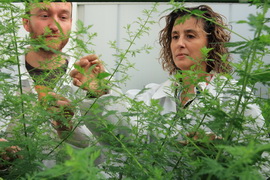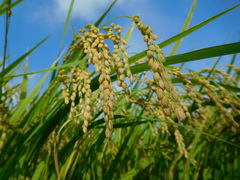|
|
Scientists Discover Gene that Doubles Artemisinin Production in Artemisia annua Plant |
|
 The plant Artemisia annua has been used for more than 2,000 years in traditional Chinese medicine to treat intermittent fevers. The artemisinin molecule – the active ingredient synthesized in this plant's trichomes – is the main component of malaria treatments worldwide. But the low content produced by the plant and the high cost of its chemical synthesis result in a scarce and costly drug. The plant Artemisia annua has been used for more than 2,000 years in traditional Chinese medicine to treat intermittent fevers. The artemisinin molecule – the active ingredient synthesized in this plant's trichomes – is the main component of malaria treatments worldwide. But the low content produced by the plant and the high cost of its chemical synthesis result in a scarce and costly drug.
An international team of researchers led by the Centre for Research in Agricultural Genomics (CRAG) and Sequentia Biotech S.L. has been able to obtain, through genetic engineering, Artemisia annua plants that produce twice as much artemisinin. The research team has identified a gene involved in the formation of plant trichomes and in the synthesis of terpenes, such as artemisinin. The AaMYB1 gene has a dual function: it promotes trichome formation in the leaves and artemisinin synthesis inside the trichomes. Soraya Pelaz, CRAG researcher and senior author of the study said, "By manipulating this gene, we have managed to grow plants which contain much more artemisinin than their wild-type counterparts." The researchers at CRAG designed transgenic plants that overexpressed the AaMYB1 gene and found that they accumulated larger doses of artemisinin than non-genetically modified plants. To confirm the role of AaMYB1 gene in trichome formation, they searched for similar genes in Arabidopsis thaliana and found the gene AtMYB61. When this gene was overexpressed in the model plant, the plant produced more trichomes. For more details, read the article in CRAG News.
|
|
|
|
|
|
|
DNA Methylation Affects the Efficiency of TALEN-mediated Genome Editing in Rice |
 Transcription activator-like effector nucleases (TALENs) are one of the most prevalent SSNs and have a potential to provide higher target specificity. However, they are sensitive to methylated cytosines that are present in transposons and active genes in plants. In mammalian cells, the methylation sensitivity of TALENs could be overcome by using a base-recognition module (N∗) with a higher affinity to methylated cytosine. However, the effectiveness of N∗ module in plants has not been explored. Transcription activator-like effector nucleases (TALENs) are one of the most prevalent SSNs and have a potential to provide higher target specificity. However, they are sensitive to methylated cytosines that are present in transposons and active genes in plants. In mammalian cells, the methylation sensitivity of TALENs could be overcome by using a base-recognition module (N∗) with a higher affinity to methylated cytosine. However, the effectiveness of N∗ module in plants has not been explored.
|
|
|
|
|
|
|

|
A biweekly update on gene editing research, regulations, and impact
produced by ISAAA Inc. |
| |
|
|

|
| A monthly update on gene drive research and development provided by ISAAA in collaboration with the Outreach Network for Gene Drive Research |
| |
|
|
|
|
GM APPROVAL UPDATES |
- The Philippines approved the canola event LBFLFK for food, feed, and processing.
- The Philippines approved the cotton event GFM cry1A for commercial cultivation.
- Brazil approved the wheat event HB4 for commercial cultivation.
- The Philippines approved the soybean event GMB 151 for food, feed, and processing.
- The Philippines approved the eggplant event EE-1 for cultivation
- The USA approved the canola event MON94100 for food and feed.
|
|
|
|
| Biotech Updates is a weekly newsletter of ISAAA, a not-for-profit organization. It is distributed for free to over 22,000 subscribers worldwide to inform them about the key developments in biosciences, especially in biotechnology. Your support will help us in our mission to feed the world with knowledge. You can help by donating as little as $10. |
|
|
|
|